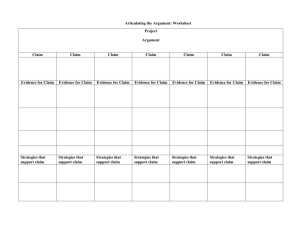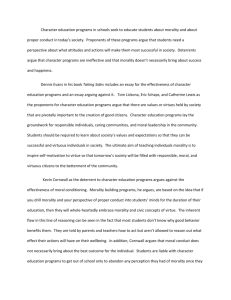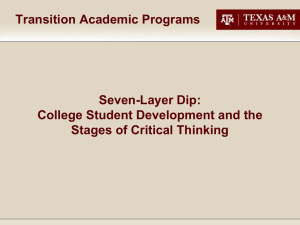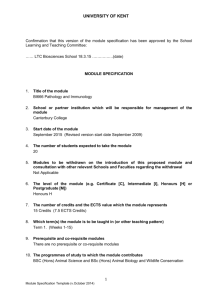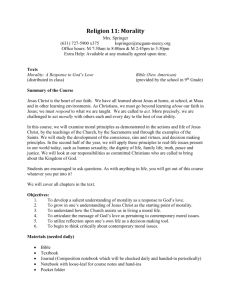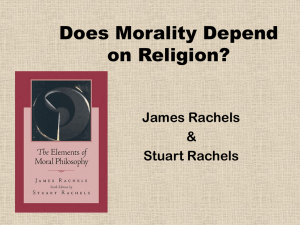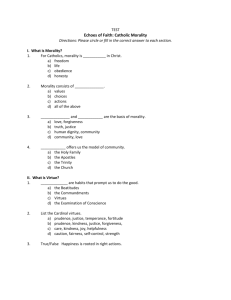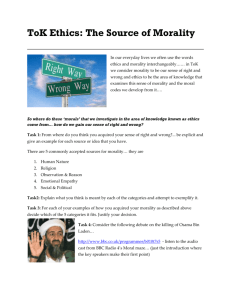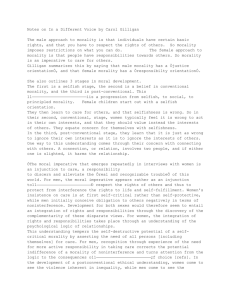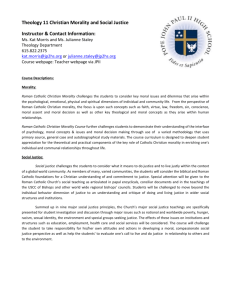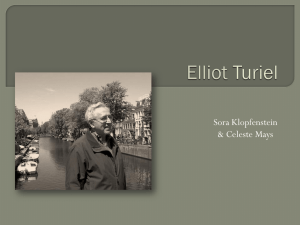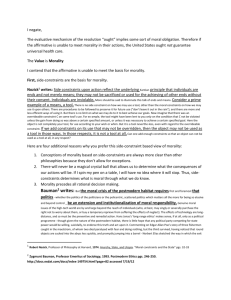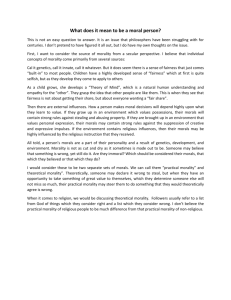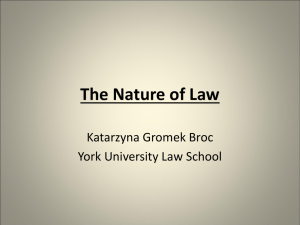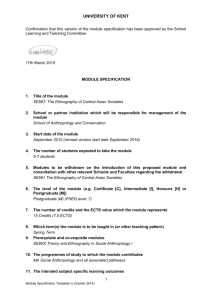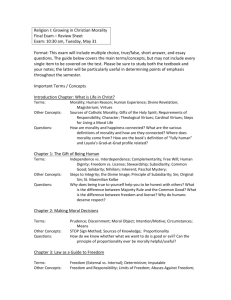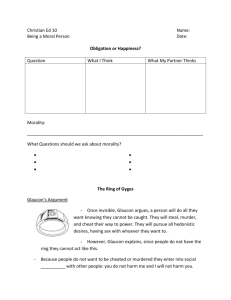University of Kent
advertisement
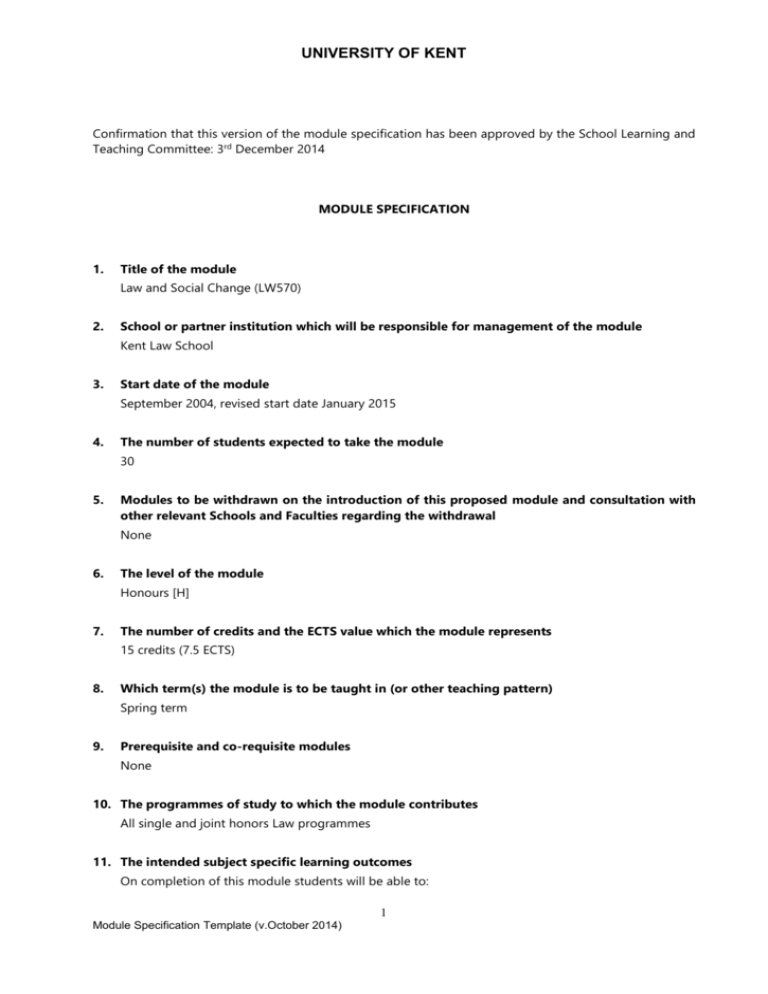
UNIVERSITY OF KENT Confirmation that this version of the module specification has been approved by the School Learning and Teaching Committee: 3rd December 2014 MODULE SPECIFICATION 1. Title of the module Law and Social Change (LW570) 2. School or partner institution which will be responsible for management of the module Kent Law School 3. Start date of the module September 2004, revised start date January 2015 4. The number of students expected to take the module 30 5. Modules to be withdrawn on the introduction of this proposed module and consultation with other relevant Schools and Faculties regarding the withdrawal None 6. The level of the module Honours [H] 7. The number of credits and the ECTS value which the module represents 15 credits (7.5 ECTS) 8. Which term(s) the module is to be taught in (or other teaching pattern) Spring term 9. Prerequisite and co-requisite modules None 10. The programmes of study to which the module contributes All single and joint honors Law programmes 11. The intended subject specific learning outcomes On completion of this module students will be able to: 1 Module Specification Template (v.October 2014) UNIVERSITY OF KENT 11.1. Employ a range of theoretical approaches to understanding law, morality, and social change, by exploring diverse perspectives, and selected case studies. 11.2. Further develop a facility for independent, critical thinking on the history, and social and political character of legal change. 11.3. Reflect upon and analyse the moral and ethical content and impact of law as it impacts on social change. 11.4. Demonstrate advanced research and writing skills 11.5 Engage in a critical discussion of the nature, function and effects of law as it has been, is, ought to and/or might be expressed in the bringing about of social change 11.6 undertake explorations, demonstrations, critical evaluations and engagements in the context of moral discourse, social struggle, conflict resolution and social integration 12. The intended generic learning outcomes 12.1 The ability to devise and sustain argument and present relevant knowledge and understanding of the relationships between law and social change in the form of reasoned argument 12.2 The ability to carry out further research from a variety of sources including scholarly reviews and primary sources to inform a sustained and detailed argument 12.3 The ability to identify and evaluate legal and policy problems according to their historical, political and legal context 12.4 The ability to analyse critically detailed conceptual current and historical material relating to law and social change, including the ability to recognize and comment on the different positions that are taken in the literature surveyed 12.5 The ability to demonstrate an awareness of the economic, political and/or social implications of legal forms and remedies in the pursuit of social change 13. A synopsis of the curriculum This module aims to investigate the relationship between law, morality, and social change, and how this relationship has changed and may change over time. In other words, it seeks responses to questions such as the following: How does law produce morality and morality produce law? What is the role of moral norms and obligation in legal practice? How does the character of law shift in response to social struggle? Why, if some modern social theories allow for the recognition of a vastly reduced number of valid norms, is moral discourse still the default mechanism for resolving conflicts in society? Has moral discourse been supplanted by other means of conflict resolution and social integration? How might we envision an ideal moral-legal framework? Typically its content will include: The meanings of law and social change Classical Social Theory, law and Social Change Contemporary social theory, law and social change The Hart/Devlin Debate: Law, Disgust, and Social Change Positive approaches to the promotion of Social Change Feminism and Legal Reform The Legal Profession and Social Change Rights and citizenship 2 Module Specification Template (v.October 2014) UNIVERSITY OF KENT 14. Indicative Reading List Core readings: S L Roach Anleu, “Law and Social Change”, Sage; 2nd Ed; 2010 K A Appiah, "The Honor Code: How Moral Revolutions Happen", W. W. Norton & Co, Reprint edition 18th October 2011 Other readings: T.R.S. Allan, ‘Citizenship and obligation: Civil Disobedience and Civil Dissent’ (1996) 55(1) Cambridge LJ 89-121 P. Devlin, 'The enforcement of morals', in R. Baird & S. Rosenbaum, eds. Morality and the Law (Prometheus, 1988), pp. 15-35; J G Finlayson, Habermas: A Very Short Introduction, OUP, 2005 G Gutting, “Foucault: A Very Short Introduction, OUP, 2005 J Habermas, “The Structural Transformation of the Public Sphere: Inquiry into a Category of Bourgeois Society”, Polity Press; 1992. L A Hall, “Sex, Gender and Social Change in Britain since 1880 (Gender and History)”, Palgrave MacMillan, 2012 H.L.A. Hart, 'The legal enforcement of morality' also in R. Baird & S. Rosenbaum, eds. Morality and the Law (Prometheus, 1988)in above, pp. 37-46; C.A. MacKinnon, Only Words (Harvard University Press, 1993), Chp. I.; M. McIntosh, ‘Liberalism and the contradiction of sexual politics’ in L. Segal, ed., Sex Exposed: Sexuality and the Pornography Debate (Virago, 1992), pp. 155-168; 'Segregated water fountain' (photograph, 1950), reproduced in S. Kasher, The Civil Rights Movement: A Photographic History, 1954-68 (New York: Abbeville Press, 1996), pp. 9; P Singer, Marx: A Very Short Introduction, OUP, 2000 R. O’Dair, Legal Ethics (Butterworths, Law in Context Series, 2001) 15. Learning and Teaching Methods, including the nature and number of contact hours and the total study hours which will be expected of students, and how these relate to achievement of the intended module learning outcomes Students will attend weekly two-hour seminar/lectures. Taking into account reading and writing weeks this will amount to a total of 20 timetabled contact hours. In addition students are expected to conduct private study in preparation for classes and assessment amounting to 150 study hours in total. These methods will facilitate the development of advanced research and writing skills. The lectures will convey to students an overview of each topic and provide an indication of weighting when drawing out specific points of relevance and key issues in relation to the module’s theoretical framework for seminar discussion and student research. This will address learning outcomes 11.111.3 and 12.2. The seminars will address learning outcomes 11.5-11.6 and 12.1, 12.4-12.5 and private study addresses 11.4 and 12.3. 16. Assessment methods and how these relate to testing achievement of the intended module learning outcomes The students will be assessed by a 6000 word research essay worth 100% of the module. There are set questions which students can choose to write from. This method of assessment meets all learning outcomes of the module (11.1-11.6 and 12.1-12.5). This module and the achievement of the learning 3 Module Specification Template (v.October 2014) UNIVERSITY OF KENT outcomes will enable students to utilise their critical skills to demonstrate their understanding of law and social change. 17. Implications for learning resources, including staff, library, IT and space None 18. The School recognises and has embedded the expectations of current disability equality legislation, and supports students with a declared disability or special educational need in its teaching. Within this module we will make reasonable adjustments wherever necessary, including additional or substitute materials, teaching modes or assessment methods for students who have declared and discussed their learning support needs. Arrangements for students with declared disabilities will be made on an individual basis, in consultation with the University’s disability/dyslexia support service, and specialist support will be provided where needed. 19. Campus where module will be delivered: Medway and Canterbury 4 Module Specification Template (v.October 2014)

